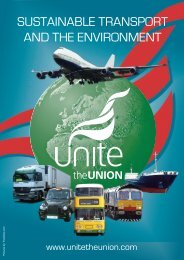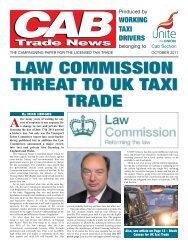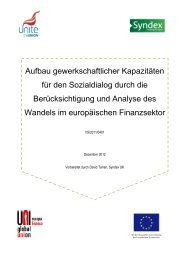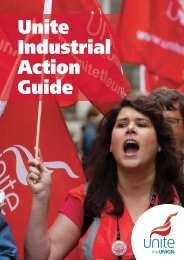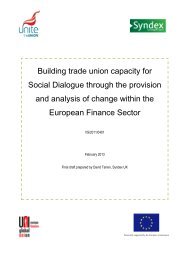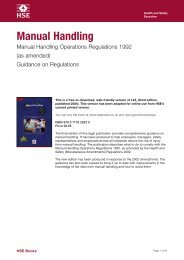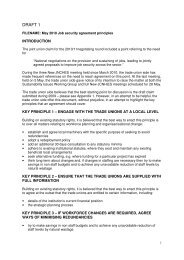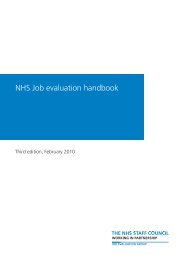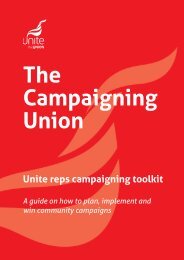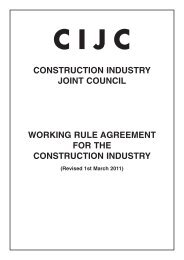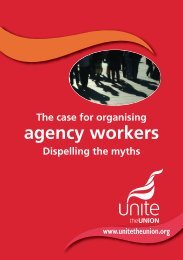Making Companies Safe - what works? (CCA ... - Unite the Union
Making Companies Safe - what works? (CCA ... - Unite the Union
Making Companies Safe - what works? (CCA ... - Unite the Union
Create successful ePaper yourself
Turn your PDF publications into a flip-book with our unique Google optimized e-Paper software.
It may be that <strong>the</strong> evidence discussed above could be explained by reference to company<br />
specific factors, and Wright does argue that <strong>the</strong> ‘general relationships’ he describes “should<br />
be used only as a guide to <strong>the</strong> focus of sector level initiatives, with <strong>the</strong> strategy adopted for<br />
organisation-specific inspections moderated by consideration of observed behaviours”. 104 A<br />
number of problems can be anticipated in relation to <strong>the</strong> proposed criteria for selecting<br />
individual firms for earned autonomy status and <strong>the</strong>se will be discussed in <strong>the</strong> following<br />
section. For <strong>the</strong> moment it is important to note that in <strong>the</strong> UK <strong>the</strong> opportunities for obtaining<br />
reliable knowledge about individual firm behaviour are extremely limited. As Smith and Tombs<br />
observe:<br />
“Such knowledge presumes ei<strong>the</strong>r a long-standing rigorous programme of<br />
basic inspection or a highly interventionist form of regulatory knowledge and<br />
information ga<strong>the</strong>ring. Nei<strong>the</strong>r of <strong>the</strong>se conditions currently exist in <strong>the</strong> UK.” 105<br />
Not only might it be difficult for HSE to obtain accurate knowledge about individual firm<br />
behaviour, it would also be impossible for HSE to ensure that ‘good behaviour’ continued<br />
in <strong>the</strong> absence of routine inspections and in <strong>the</strong> event of a less favourable economic<br />
environment. This is a significant concern since it is acknowledged that ‘organisational virtue’<br />
is highly contingent and subject to flux in changing economic circumstances. For example,<br />
Haines found that:<br />
“while cultural influences may be capable of arising independently, in fact <strong>the</strong>y<br />
tend to have effect only if economic circumstances have generated “breathing<br />
space” within which <strong>the</strong>y can work.” 106<br />
And Ryggvik’s study of <strong>the</strong> Norwegian offshore oil industry demonstrates that <strong>the</strong> existence<br />
of SMSs within organisations is not a guarantee that good health and safety performance will<br />
be maintained in <strong>the</strong> context of less favourable conditions. Ryggvik notes that during <strong>the</strong><br />
1980s oil production in <strong>the</strong> North Sea was running at full speed, and oil companies could<br />
<strong>the</strong>refore afford to satisfy regulatory and workforce demands for improved safety while still<br />
securing profits far above average. However, once <strong>the</strong> price of oil fell, and <strong>the</strong> favourable<br />
underlying conditions began to change during <strong>the</strong> 1990s, expenditure on safety was cut<br />
massively, companies downsized, <strong>the</strong> use of contractors increased, and maintenance work<br />
was affected. Gas leaks and o<strong>the</strong>r safety incidents that occurred during <strong>the</strong> 1990s appear to<br />
have been a direct result of cost-cutting measures and decreased attention to safety.<br />
Meanwhile, Ryggvik notes that <strong>the</strong>re has also been a recent increase in offshore fatalities. 107<br />
It appears <strong>the</strong>n, that some sort of regulatory oversight and intervention is crucial to ensure<br />
that changing circumstances do not result in a deterioration of health and safety standards.<br />
In <strong>the</strong> following sections some of <strong>the</strong> issues and potential problems raised in <strong>the</strong> previous<br />
discussion will be explored in more detail. In particular we will consider <strong>the</strong> implications of <strong>the</strong><br />
empirical evidence for how a system of ‘earned autonomy’ might be administered.<br />
Potential Problems with Regulating<br />
‘Earned Autonomy’<br />
As we have seen, <strong>the</strong>re is no empirical evidence to support <strong>the</strong> claim that <strong>the</strong>re are<br />
companies in <strong>the</strong> UK capable of achieving and maintaining a level of health and safety<br />
performance that would justify <strong>the</strong> withdrawal of regulatory oversight and inspection. On <strong>the</strong><br />
contrary, and according to Wright et al., <strong>the</strong> empirical evidence suggests that self-regulation<br />
is highly unlikely to occur without <strong>the</strong> threat of enforcement and proactive direction and<br />
intervention of <strong>the</strong> regulator – even amongst high risk, and technologically sophisticated<br />
organisations. 108<br />
Assuming, however, that our (and o<strong>the</strong>rs’) interpretation of <strong>the</strong> empirical evidence is<br />
incorrect, we would still argue that <strong>the</strong> evidence suggests <strong>the</strong>re may be intractable problems<br />
relating to <strong>the</strong> implementation and monitoring of such a scheme and that it is unlikely even<br />
to deliver <strong>the</strong> benefits that HSE hopes to gain from it (namely budgetary savings).<br />
94<br />
To come back to <strong>the</strong> question posed by <strong>the</strong> HSE in <strong>the</strong>ir discussion document, <strong>what</strong> should<br />
count as ‘good performance’ and how can it be identified at <strong>the</strong> level of <strong>the</strong> individual firm<br />
level?




